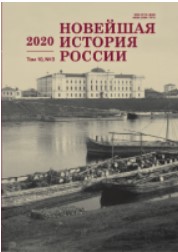А. В. Карташев о взаимоотношениях русских православных приходов в Западной Европе с Московской патриархией в 1920–1930-х годах
A. V. Kartashev on the Relationship between Russian Orthodox Parishes in Western Europe and the Moscow Patriarchate in the 1920s — 1930s
Author(s): Aleksandr Vasilievich AntoshchenkoSubject(s): Political history, Government/Political systems, Politics and religion, Interwar Period (1920 - 1939), Eastern Orthodoxy
Published by: Издательство Исторического факультета СПбГУ
Keywords: Anton Kartashev; Eulogiy (Georgievskiy); Anthoniy (Khrapovitskiy); Sergiy (Stragorodskiy); Russian Orthodox parishes; Western Europe; Synod of Bishops; Russian Orthodox Church Abroad; Moscow Patriarch
Summary/Abstract: The author carries out a discourse analysis of journalistic articles by well-known Russian emigrant historian, theologian, and public figure Anton Kartashev in order to understand his attitude to the schisms of the Russian Orthodox Church caused by the Russian Revolution, and to clarify his methods for shaping his readers’ perceptions of these events. This analysis reveals a complex correlation of political, religious, and historical argumentation. From the very beginning, political arguments were pushed into the background by a statement of apolitism, which initially extended to Russian emigrants. Subsequently, he abandoned apolitism as a principle of activity in exile in order to consistently pursue a policy of intransigence with the Bolsheviks. Political argumentation remained in the background compared to historical and religious facets, since the church should not interfere in politics. He consistently historicized contemporary experiences, based on a historical perspective, to give an assessment of the political orientation and concrete actions of the hierarchs. This created an illusory opportunity to maintain the legal subordination to the Moscow Patriarchate, which increasingly depended on the Bolshevik regime. He saw the post-revolutionary history of the Russian Orthodox Church as a series of schisms that weakened it. This gradually brought a precise religious argument to the forefront in substantiating specific measures to preserve the canonical structure of Western European parishes headed by the Metropolitan Eulogius, at the break with the Synod of Bishops in Sremski Karlovtsi and with the Moscow Patriarchate.
Journal: Новейшая история России
- Issue Year: 10/2020
- Issue No: 32
- Page Range: 643-666
- Page Count: 24
- Language: Russian

